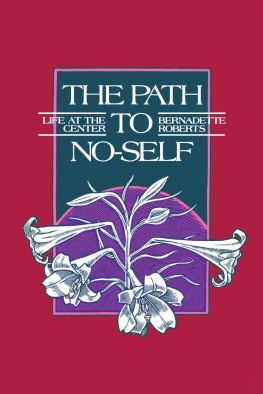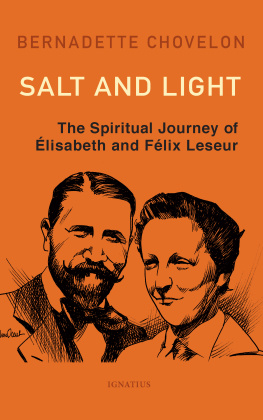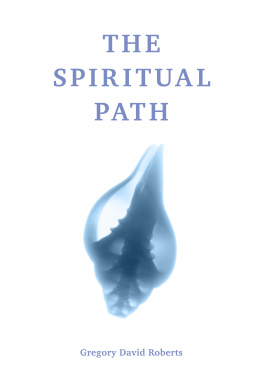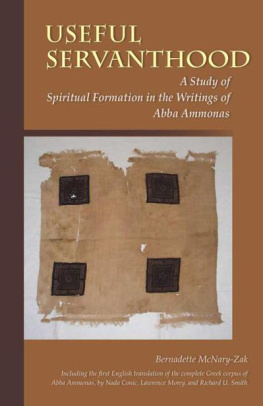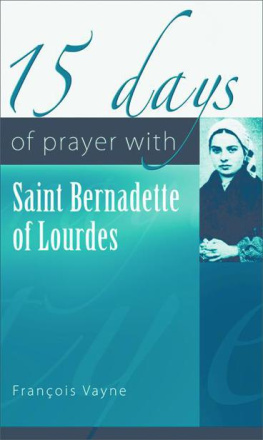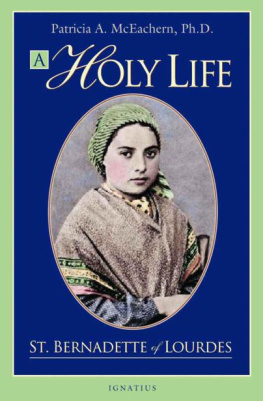The Path to No-Self: Life at the Center
Bernadette Roberts
Contents
Preface
This book is a personal account of a particular stage in theChristian contemplative journey, a stage I call the path to no-self. Afterthe book was first published, however, certain misunderstandings aroseregarding the terms ego and self and exactly what I mean by no-ego and no-self.Since this preface is being written in anticipation of a second edition, Iwould like to take this opportunity to clarify these terms and, at the sametime, give a brief overview of the completed journey.
Our spiritual journey begins in earnest when we follow up ona gratuitous grace a revelation or piece of enlightenment that virtuallyturns our life around. To seek this grace more abundantly and to make ourselvesworthy of it, our energies become focused on a reformation of life, acommitment to spiritual practice, a total dedication to pursuing an intimatelife with God. Although this reformation is something we must do, our bestefforts will only get us so far in this matter. The changes we can bring aboutby our own efforts are relatively impermanent and superficial. Above all, theyare still reversible. It is where our own efforts come to an end when we havedone all we could do that God takes the initiative and the truetransformation process begins. Because only Gods transforming grace can effecta profound, irreversible change in our deepest experience of being, we can saythat where reformation ends, authentic transformation begins.
Since a great deal has been written on the beginning orreformative stages of the spiritual journey, the account given in this bookbegins with the transforming process. In the Christian mystical tradition theonset of this process is known as the Passive Night of the Spirit. Althoughthis phrase was coined by John of the Cross for a particular set ofexperiences, these experiences were already well known to his contemplative peers. In modernpsychological terms, entrance into the Passive Night of the Spirit is thefalling away of the original self-center, or ego, and the consequent encounterwith a great emptiness or void in ourselves. Where previously we hadencountered God, now there is only darkness and nothingness. Although thisinitial event is experienced as an absence of God, we know that God cannot beabsent. Thus John of the Cross affirms that this darkness is due to asuperabundance of light like being struck blind when looking directly at thesun. What makes this direct look possible, however, is the falling away orabsence of the self-center (ego) which had veiled or obstructed the deeperrecesses of being. Unknown to ourselves, prior to this point in our journey theego had been the veil through which we had seen or encountered God. The ego,overlying the divine center, had been that in us which experienced the divine. Whenthe ego fell away, it took its experience of God with it. Although thisexperience is accompanied by a sense of being lost to ourselves, this loss ofself is overwhelmed by our greater sense of having lost God. Without God wehave no sense of a deeper self and, thus, without a deeper self (the ego inthis case) we have no sense of God.
It is important to point out that until the ego falls away,the deepest and truest self we know is the ego-self. It is only in retrospectthat the true nature of the ego can be identified or known by its absence. As our originalself-center, the ego is neither false, bad, nor necessarily selfish. Indeed, itwas this ego that experienced God and put all its energies into the pursuit ofGod and a holy life. The ego is only false when it refuses God and clingssolely to itself. In my own journey, what I would later know as the ego, Ihad originally called my real self, sometimes my true self (as opposed to asuperficial self) because this was the deepest self I knew prior to its fallingaway. Not for a second did it occur to me that this deepest self could fallaway. In the Passive Night of the Spirit, however, this ego-center falls awayand, with it because of its attachment to God goes the whole experience ofGod; thus, we seem to be without God. Our first concern is to find God, for weknow that only in God will we ever find our true self. The Passive Night of theSpirit, the falling away of the ego-center, is the dire experience of emptinessand void in ourselves, an absence of God and our deepest self that leaves us inutter darkness feeling as if the center of our being has suddenly fallen out.
As the whole psyche or person begins to adjust to this stateof nothingness, the interior eye gradually acclimates to the darkness, and inthe depths of this darkness Gods face eventually appears. In Christian termsthis whole process is known as transforming union. Thus, entrance into thePassive Night of the Spirit is the beginning of the unitive state or unitive wayof life. The major change affected in this Night is that our initial, deepestsense of being is replaced by the indescribable sense of Gods being, so thatGod and self are indistinguishable in our singular sense of being. We mightdescribe this change as a movement from an I-thou consciousness to a simple andsingular We consciousness. The end of this transforming process will be markedby a definitive, unitive revelation: a wholly divine center wherein our deepestself is hidden in oneness with God.
With this revelation the inward movement of our journey isfinished, completed. We cannot go deeper than the deepest the divine center.Having come to this divine end, with nothing more to be desired, it appears wehave gone as far in this life as is humanly possible. Looking around, we see nopath anymore; ahead, there only appears to be a permanent dissolution ineternal bliss, a condition, however, that seems incompatible with continuedearthly existence. Of our own accord we cannot take this permanent step; thechoice is not ours to make. What is left, instead, is the exercise of this newunitive state in the ordinary affairs of life. Thus, the journey now turns (orreturns) to the marketplace. Where initially the movement of the journey hadbeen inward, the journey now turns around and becomes an outward movement.Unknown to us at the time, this outward movement the marketplace is animperative stage of the total journey. Lying beyond the unitive revelation, themarketplace is the unknown path that leads to yet a greater end the fallingaway of the divine center wherein self is hidden in its oneness with God. Thepath from the beginning of the journey to the unitive state is the path tono-ego, a path well known and articulated in contemplative literature. From theunitive state outward to the end of the marketplace stage, however, is theunknown path to no-self, a stage not often recognized in contemplativeliterature as necessary and vital for the completion of the journey.
The longer we live in the unitive state the more ordinary itbecomes. After many years we look back and see that the transforming processhad actually been a process of human maturation. We see too, that withoutrealizing an abiding oneness with God, no human being can be regarded asauthentically mature. Neither chronological, psychological, anthropological,or any developmental age can rightly define human maturity; only atransformation wrought by God can beget the mature individual. Duringtransformation it was the action of grace that gave this process its mysticalflavor; in fact, we often refer to those who have been through this process asmystics, a mystic being none other than an authentically mature human being.At the same time, we ask: Is this maturity the end of Gods work in us? DoesGod intend no higher destiny for man than his becoming a mature human being?
After many years lived in the unitive state, we have toacknowledge that although it is a profound and happy improvement over animmature, egoic existence, it is not a totally perfect state certainly it isnot heaven or mans final destiny. The continuation of self-awareness and thearising of self (thoughts and feelings) in response to lifes events, remain asa subtle obstacle to a totally selfless love of God. Somehow, self still has atoehold or a finger in everything we do. Although these self-responses seem tobe a requirement of earthly existence and present no major problem, theynevertheless stand in the way of a more perfect state. Apart from sitting stilland aloof the rest of our lives, we cannot imagine how ordinary life could goon if all such self-responses were permanently to cease. Also, we do not seeany way we could possibly make this happen; in truth, only God can bring abouta permanent cessation of self. Just as the falling away of the ego-center wasGods doing, so too, the eventual falling away of all self can only be broughtabout by God. Thus when the unitive state has been lived to its fullestpotential or when there is nothing left in the marketplace to experience, theunitive state self and God falls away in one fell swoop. Just as we had notanticipated the falling away of the original self-center (ego), we could neverhave anticipated the falling away of the divine center.

